#Lazar Kaganovich
Explore tagged Tumblr posts
Text
"I saw a recent meeting of the Council of Ministers on TV. I was sitting there in front of the television, feeling sorry for myself, feeling indignant. Poor Ryzhkov! He was saying: Comrades, it is impossible to go on like this, if it continues like this the country will be devastated, destroyed. We need order, legality... But why agitate the people like this? Why scare them? The prime minister should reveal the names of those responsible, make the scoundrels who corrupt, who do not send food or material supplies, put them on trial, send those scoundrels to prison for ten years... Instead, there is general whining. I hear another minister saying: Since 1988, goods have been disappearing from such and such a port. But where have you been, minister, all this time? How did you allow such a thing? And every time, at the end of these discussions, they say that what is happening in the country is the fault of... Stalin. This is the moral of every speech: Stalin is guilty, it was Stalin, Stalin, Stalin, everyone is on him. But Stalin died thirty-five years ago! Thirty-five years! What does he have to do with today's troubles? Many people remember Stalinism with horror... The people are always ill-disposed towards what was in the past. So it is said that all those who once commanded were monsters. Stalin - a monster. Molotov - a monster. Kalinin - a monster. Kaganovich - a monster. The whole past is besmirched, absolutely everything, to the point of criticizing the October Revolution. Of course, the people have good reasons to protest, to be discontent. But the people must be led by the hand, they must be led, as they used to say in the past, not with a metal club, but with ideology. With ideas. With the compactness of the party."
Lazar Kaganovich commenting on the Gorbachev administration's failure to tackle party and state corruption as the Soviet economic crisis of 1988 worsened into a general political crisis in 1990
39 notes
·
View notes
Text
⚠️ DON’T START DISCOURSE ABOUT RPF IN THE NOTES!! YOU WILL BE BLOCKED IF YOU DO SO ⚠️
Do you ship it?

Reason:
“Kaganovich was a participant in the Russian Revolution and became a "200% Stalinist" according to Molotov (his political rival, himself also very close to Stalin) and always shared Stalin's viewpoints no matter what jobs he was put in charge of or if it cost his friends or family jobs or lives during party purges. Kaganovich's letters and telegrams to Stalin show a great amount of respect and admiration of Stalin (always using the formal "you" in Russian), with Stalin expecting his loyalty and best efforts to carry out his tasks back. Also, Kaganovich coined the term "daddy Stalin". He also earned the nickname "Iron Lazar" for his unerring dedication to carrying out party purges and never denounced Stalin after his death.”
#do you ship this rpf ship#rpf#real person fiction#rps#real person shipping#shipping#shipping poll#joseph stalin#lazar kaganovich#stalganovich#revolutionaries#politicians
13 notes
·
View notes
Text
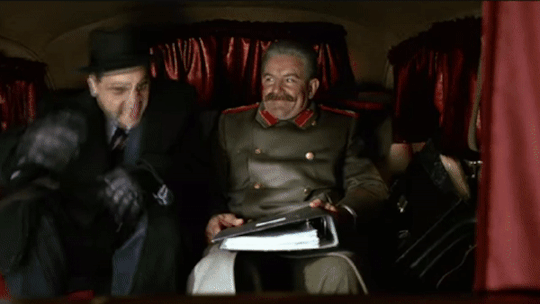
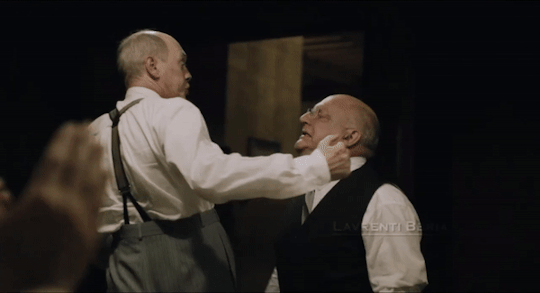
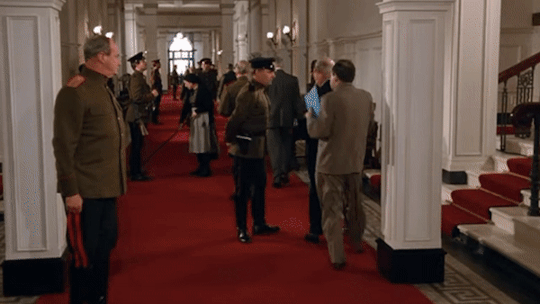
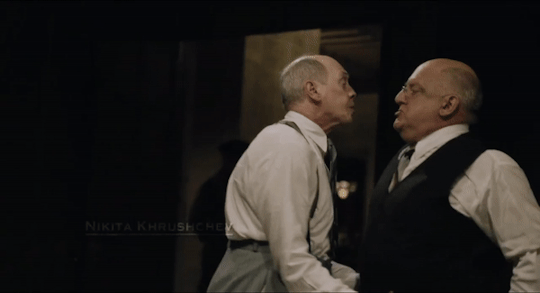


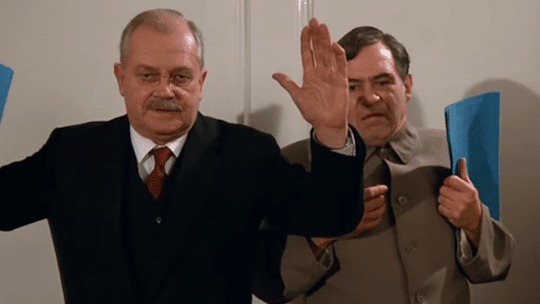
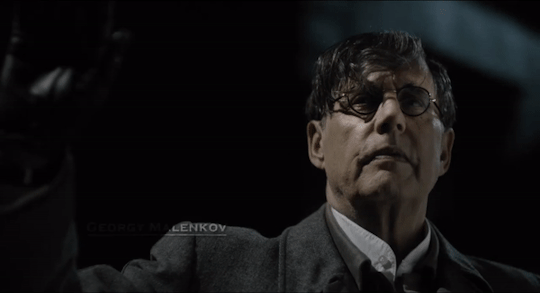

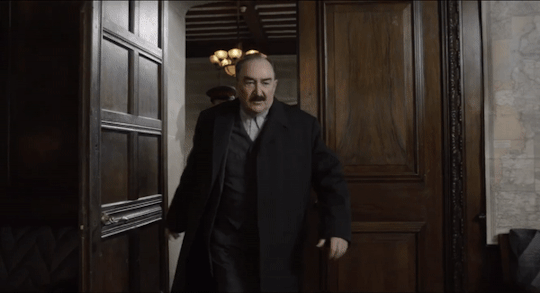

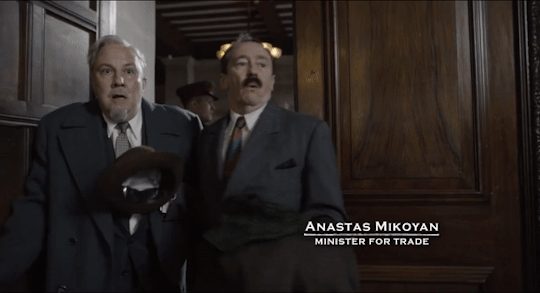
Meet the Politburo...
Red Monarch (1983, dir. Jack Gold) || The Death of Stalin (2017, dir. Armando Iannucci)
#red monarch#the death of stalin#movies#ussr#nikita khrushchev#vyacheslav molotov#anastas mikoyan#lazar kaganovich#lavrentiy beria#georgy malenkov#michael palin#steve buscemi#jeffrey tambor#simon russell beale#paul whitehouse#dermot crowley#david suchet#nigel stock#peter woodthorpe#brian glover#george a cooper#such a shame theres no bulganin or zhukov for red monarch!#and voroshilov in the death of stalin!#armando iannucci#jack gold
107 notes
·
View notes
Text

- Serhii Plokhy "The Gates of Europe - History of Ukraine"
#ukraine#ukrainian history#history#serhii plokhy#ukrainian languages#holodomor#ussr#genocide#communism#collectivisation#ussr history#soviet history#joseph stalin#lazar kaganovich
77 notes
·
View notes
Note
Besides Beria or Khrushchev, were there any other actual contenders to take over after Stalin's death?
The Anti-Party Group, which was led by Malenkov, Molotov, and Kaganovich, although their move was to appoint Bulganin so he technically would have been the new First Secretary.
Thanks for the question, George.
SomethingLikeALawyer, Hand of the King
8 notes
·
View notes
Text
Allah had mercy on him and he died before the USSR dissolved for good, even though I'm pretty sure he saw coming anyway...
it always kind of messes with me that kaganovich lived until june of 1991.
he was there for the entire ride. from the very start to the very end. and he was also 100% correct about the slippery slope soviet discourse was taking.
how absolutely punished must that have been. like molotov but 10x worse. iron lazar you poor bastard.
63 notes
·
View notes
Text
Press Release from Podgorny
Hello comrades, Mikoyan has shocked us all. We are supposed to be brothers in arms, living in unity in this great motherland. However, Anatas Mikoyan, the Minister of Forestry and the former Minister of Heavy Industry and Engineering, have attempted assassinations on our beloved comrades, Comrade Khrushchev and Comrade Zhukov. Mikoyan, are you not shameful of your own actions. Comrade Khrushchev and Comrade Zhukov are our beloved friends, our brothers. Yet, you attempt an assassination and BLAME IT ON OUR BELOVED COMRADE, Lazar Kaganovich! Shameless! Prosperous!
0 notes
Text
The Last Bolshevik speaks
An expect from KAGANOVICH SPEAKS 'WE ARE NOT MONSTERS' one of Lazar's last interviews taken from the archives of La Repubblica, the interview was conducted via written questions with answers recorded by tape and published in 1990 a year before Kaganovich would pass of natural causes at 97, 5 months before the dissolving of the USSR
Q: You were a great propagandist and leader. If you could address Soviet citizens, what would you say today?
A: I would tell them to continue fighting the battle for communism, for the ideas of Marx and Lenin. I would say that we are facing the resurgence of nationalism and chauvinism. Ah, of course, if I had an audience like the ones I was used to since I was a boy... When I was sixteen, I once organized a meeting of young workers on the problem of literacy and school education. I had more culture than them, I was a learned young man. But they understood me. You have to know how to talk to young people. And today's youth seems to me to be at a much lower level than the workers I spoke to in 1913. They are a youth ready to be dragged along by anyone. With them we should start again from the beginning, from the ABC.... Yet there is a great debate in society, young people are active in movements of all kinds, they talk about everything... Yes, they discuss, but about what? When I read the petty interviews of certain former members of the Politburo, or certain memoirs... They tell the story like this: I went, he came, he said, I said... But what does that mean? What does it mean? We need to talk about ideas. Of ideas! Of substance! Of content! Instead, what are our so-called public movements talking about today? There are at least fifty of them, and fewer than fifteen parties never participate in the various elections. And they all only create confusion in the minds of young people. If I had to speak, first of all I would distinguish. You have to address old managers in one way, middle managers in another way, petty bourgeois and philistines in yet another way... and then you have to address the enemy in a different way, you talk to the enemy as he deserves. And that's where I would start. I would say: be careful, comrades, they are attacking us! Bourgeois ideology is on the attack, and it must be recognized that it has won many battles at this moment. What is happening in Poland? And in Hungary? We are retreating! And what is happening in Poland and Hungary is the premise of what can happen here too. It's something that makes me sick. It makes me cry. Why has my health gotten worse? Because it worries me when I see what is happening in Eastern Europe, in Germany.
Lazar M. Kaganovich
47 notes
·
View notes
Text
KIROV!! KLIM!! LAZAR!!

with ai i can put flower crowns on anyone i want







#ahhhhhh#they're all so cute omg#tagging the whole gang >:)#sergei kirov#joseph stalin#vyachaslev molotov#vladimir lenin#lazar kaganovich#kliment voroshilov#sergo ordzhonikidze
16 notes
·
View notes
Text
I WAS BORED OKAY
#viv's edit#viv's post#ussr#soviet history#mean girls#soviet union#nikita khrushchev#joseph stalin#vyacheslav molotov#kliment voroshilov#lazar kaganovich#anastas mikoyan
14 notes
·
View notes
Text

- Serhii Plokhy "The Gates of Europe - History of Ukraine"
#ukraine#ukrainian history#history#serhii plokhy#holodomor#ussr#genocide#communism#collectivisation#ussr history#soviet history#joseph stalin#lazar kaganovich#nikita khrushchev#famine
46 notes
·
View notes
Note
Was ‘Iron’ Lazar Kaganovich a potential candidate to succeed Stalin? Or did he not want to be Premier of the SU?
He was a leading figure in the "Anti-Party" group but they had coalesced behind Bulganin. They did so because Bulganin was very popular with the reformists (who Khrushchev championed), so they could sell their attempt to oust Khrushchev as a principled stand against Khrushchev's increasing centralization and not a partisan affair.
Thanks for the question, Anon.
SomethingLikeALawyer, Hand of the King
5 notes
·
View notes
Text
muined replied: Express them!
ohhhh ok so essentially after reading that book i can't shake the feeling of... the sheer....awe?
i think im just immensely intrigued by how fitzpatrick describes stalin and the politburo as functioning as being like a very dysfunctional family.
she emphasizes a lot how the story of stalin's team is kind of a tale of stalin shooting himself in the foot in regards to all his personal friendships so many times that at the end of things the only people he can rely on (and even then-) are the literal politburo, his work buddies. and the way he treated them interchangeabley with abuse, threats, attacks against their friends and family, as well as protectiveness and paternalism ("he valued friendship deeply, which wasn't to say he couldn't be disloyal").
whats debatable is how much of that his team: the rest of the politburo: recognized or reciprocated.
(and honestly, also a bit of possessiveness?) (fitzpatrick describes stalin a lot as being like a old senile grandfather figure/family figure in the later chapters)(and i mean its not hard to see why: late into his life he was dragging all of the team to join his vacations/nightly parties with him lmao)
(but there's a moment in the book where she points out how stalin was always afraid of flying on planes and as a result he forbade the politburo from flying in them. and another where she makes a point how stalin didn't save any of his relatives from the purges because he thought that if his team couldn't save their friends and family from the purges, then he shouldn't either. (which is her opinion ig))
(so. he cares. in his own highly disturbing way)
she talks a lot about the interrelationship between the politburo as well! the ties of friendship and how these friendships are so easily dropped in the environment these people are in, the cycles of betrayal and blame and denunciation, how there was, despite everything, despite what all of them would later claim-- there was- if not friendship- attachment and care and camadiereship there!!!
(otherwise why would there have been a time when the team fought tooth and nail to keep molotov and mikoyan on board? why would there have been a time when malenkov and khrushchev went on nightly strolls together and why would khrushchev have made an active effort to connect with them when he first came into moscow? why would they have joined together so smoothly to meet stalin at his dacha at that infamous story of them bringing him back from self-seclusion int othe government? what about the car rides and drunk sessions where they were the only company each other had and had to be driven home by each other? molotov implies later that beria convinced the other members of the politburo to stand by him when stalin was in his uhh Moments out of self interest but like. really? )
the interrelationship between the politburo is certainly interesting but i dont have any words to describe it aside from how when stalin was in his final days he told the team how they were like "kittens" and wouldn't survive a day without him.
except they did survive! for a while there mikoyan and molotov and malenkov and beria nad khrushchev and bulganin Were! Able! to form to functioning collective leadership! its like no matter how much stalin wanted to impose his will and influence onto them he was never able to fully do it- sorry stalin but the men you've chosen to be your confidants/cronies/surrogate friends for your fucked up lonely life/yes-men are actually competent with individual goals that they found would better come to fruition with each other than with you!
(i have a very vague suspicion that after stalin's death beria was trying to usurp stalin's position as protector/paternalistic figure for the team for lack of a better word btw. that's what the whole conversation with khrushchev that he has- the one where he says "i promise to give all of you your own houses and dachas and private property to give to your heirs" - conversation reads like to me)
it's the way that how stalin viewed the politburo differed from how the public viewed them and how they viewed each other.

so stalin saw their servility as a Cabal Effort to work together, hide their dissidence, and undermine him and he was so mad about it v. the team seeing it as a form of self preservation- i don't think they were nearly as close as Stalin thought they were
and there's a third aspect: how the public saw it and how they tried to shape the way the looked to the public
(doglike yes-men obedience, according to some observers (and most of the western media!), heroes or villains, representatives of the Old Bolshevik past or degenerate traitors, just non-existent to others)
and oohhhh god not to put Horrid American Democratic Opinions onto soviet politics but the impact of public opinion and the way they tried to shape it (writing their memoirs, caculating their actions based on public approval, the shifting on blame of stalin era atrocities onto one another (especially on beria) while trying to reap the benefits) (they cared! they cared about what the public thought so damn much!!)
theres a certain level of tragedy to how they came to Be, especially with mikoyan and voroshilov and molotov for example starting out genuinely fond of stalin on a personal level and having all these personal stories (fitzpatrick cites kaganovich abt how they + stalin used to stroll moscow sometimes and tease kirov about how he didn't have mustache)(he mentions in particular how in those days stalin didn't have bodyguards and. god. isn't that something?)(it says a lot about how by the end of his life the people stalin had in his closest circle were the same ones who didn't know him before the 1930s) and how it Ended (the team spllintering apart, in old age, unable to contact each other despite- or because- of the shared weight of history between them...)
and this is all without getting into the Shticky Wicky with the Old Bolsheviks because. Uh. what the fuck was that.
anyways, the point is, tldr: au in which all the politburo members (kaganovich, khrushchev, molotov, mikoyan, bulganin, beria, malnekov, maybe zhdanov and voroshilov) at the moment of their deaths travel back in time and have to live in the poast with each other and stalin again (with stalin, of course, not being time travelled himself) and having to deal with theyr Many Hangups and unresolved tensions regarding each other. many things are stopping me from writing this and one is that I Do Not Know That Enough About Soviet Politics Culture and Society In This Era to do it Justice.
the Thoughts im having after reading on stalin's team....they can't be safely expressed in a Normal setting
#also this is going to go in the tags but. of the many interpretations of k/b i think the one that hits me the most is if#ok so fitzpatrick says that the moment b tells k about the everyone gets a dacha plan in the car- its highly unusual for beria "a man usual#y very cunning“ to do so like he actually believed khrushchev would fall for that ”obvious flattery“#and i think maybe he did fall for khrushchevs farmersona. as in thought this was a guy he needed to control/protect and COULD control#and maybe it is possible that he really was going to-maybe not full out dachas- but try to reward k and the others in order to keep them o#a leash? he was p obviously angling for a leadership/organizer position and intermediary for the politburo while stalin was alive#maybe he was trying to do something like that before he got offed- “ill run everything now yall just relax i can hadle all of this”#and of course no one was taking that-esc considering the unsocialist way he was taking it#but perosnally i think itd say something if the cause of berias downfall was being fucked over by the one group of people he himself#didnt have intentions of (seriously) fucking over#but that might be giving b too much credit#ussr#joseph stalin#nikita khrushchev#molotov#mikoyan#lazar kaganovich#lavrentiy beria
12 notes
·
View notes
Text

Voronezh Military Revolutionary Committee and its chairman Lazar Kaganovich.
Autumn, 1919.
13 notes
·
View notes
Text
Lazar Pointer

A cursed image.
3 notes
·
View notes
Text
Maybe it's the reincarnation of Lazar Kaganovich, literally the only Jew to maintain any sort of position of power during Stalin's purges because he was so utterly devoted to the man that he let his own brother be executed on charges he knew were false. That was the difference between communism and fascism-communism would let you stay a part of the autocracy even if you were a part of an "undesirable" class as long as you totally abandoned everyone and everything else to the gulags the instant you were asked. And also were unflinchingly loyal to all the right people. And also never randomly brought about their ire. And also just got lucky.
I cannot get over people comparing Hamas’s terrorism to Jews rebelling against Nazis.
Hey remember that time that a big group of Jews stormed a German civilian town and killed a bunch of babies and r*ped a bunch of women… oh wait… no, no I do not.
1K notes
·
View notes